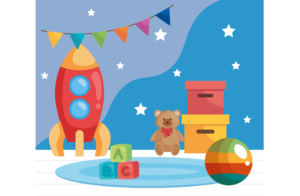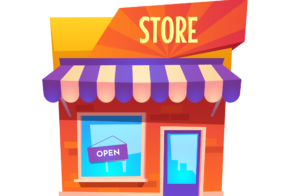Start an Educational Toy Store

In today’s world, where early childhood education and development are becoming top priorities, the demand for educational toys has reached new heights. Parents, educators, and caregivers are actively seeking toys that provide not just entertainment but also enhance children’s cognitive, motor, and social skills. This growing trend has opened up a vibrant market for educational toy stores, making it an ideal time to explore How to Start an Educational Toy Store. Embracing this rewarding venture not only offers financial potential but also allows you to contribute positively to children’s learning experiences.
In this blog, you will learn how to start an educational toy store from scratch. We’ll guide you through every crucial step, including effective planning, sourcing quality products, and implementing successful marketing strategies. Whether you’re interested in opening a brick-and-mortar location or launching an e-commerce platform, this comprehensive guide will equip you with the knowledge and tools you need to thrive in the educational toy industry.
Also Read:– How to Start Cloud Kitchen
1. Research the Market and Define Your Niche
Researching the market and defining your niche is essential for building a successful educational toy store. By targeting a specific segment, educational toy stores can better cater to customer needs and differentiate themselves from competitors, creating a unique identity that appeals to parents, educators, and caregivers.
Action Steps:
- Identify Your Target Audience: Decide on the age group and learning needs your store will cater to, such as toys for toddlers, school-aged children, or those with specific developmental needs. Targeting groups like parents, teachers, and homeschoolers can also guide your product selection.
- Research Competitors: Examine other educational toy stores, both online and physical, to understand their product offerings, pricing strategies, and customer service. This analysis will help you identify opportunities to differentiate your store.
- Choose a Niche: Focusing on a niche, such as STEM toys, Montessori-inspired products, or eco-friendly toys, can help attract a dedicated customer base. For example, a store specializing in STEM learning toys for kids aged 4-10 could draw in parents and educators looking for engaging science and technology-based toys.
2. Develop a Business Plan
Creating a detailed business plan is the backbone of any successful learning toy store. This plan should outline your goals, target audience, product inventory, and financial strategies, serving as a roadmap for growth and helping secure funding if needed.
Key Elements of Your Business Plan:
- Key Elements of Your Business Plan for a Learning Toy Store:
- Mission and Vision: Establish a clear mission for your educational toy store, focusing on your goals—whether it’s promoting play-based learning or offering toys that enhance creativity and critical thinking skills.
- Product Range: Define the product variety your learning toy store will offer, from STEM kits and building sets to toys designed for special needs. A diverse price range can attract customers across various budgets.
- Market Analysis: Conduct thorough market research to understand the demand for educational toys locally and online. Look into trends in early childhood education, homeschooling, and child development to shape your store’s unique offerings.
- Financial Plan: Break down startup costs, including inventory, website creation, and marketing expenses. Identify funding options, such as loans or investors, to support initial operations for your educational toy store.
- Marketing Strategy: Develop a plan to reach your target audience through social media, partnerships with local schools, or participation in community events. These efforts can help build visibility and drive traffic to your learning toy store.
Also Read:- Steps to Start a Spice Business in India
3. Obtain Necessary Licenses, Permits, and Insurance
Before launching your educational toy store, it’s essential to comply with local regulations and legal requirements. This crucial step will help you avoid complications down the line and ensure smooth operations for your learning toy store. Failing to secure the necessary licenses and permits can result in fines or even the shutdown of your business, which could jeopardize your investment and hard work.
Additionally, understanding local regulations can provide insights into market trends and consumer preferences, allowing you to tailor your offerings to meet community needs effectively. Researching zoning laws can also help you choose the right location for your physical store, ensuring that your educational toy store is accessible to your target audience.
Essential Licenses and Permits:
- Business License: Register your educational toy store to operate legally within your jurisdiction.
- Sales Tax Permit: Secure this permit to collect and remit sales tax as required in your area, helping you stay compliant with tax regulations.
- Zoning Permits: If you plan to establish a physical location for your learning toy store, ensure compliance with zoning laws specific to retail businesses.
- Insurance: Safeguard your educational toy store by obtaining general liability insurance and property insurance. This coverage is vital for addressing issues such as theft, damages, and product liability.
Also Read :- How to Start Preschool Business in India
4. Source Quality Inventory
Sourcing quality inventory is a critical factor for the success of your educational toy store. The uniqueness and educational value of the toys you offer will not only shape your brand’s reputation but also attract loyal customers. Focus on selecting educational products that align with your store’s mission and cater to the developmental needs of children.
By curating a diverse range of high-quality toys, from STEM kits to creative building sets, you can differentiate your learning toy store from competitors. Collaborating with reputable suppliers and manufacturers will ensure that your inventory meets safety standards and educational goals. Remember, the right selection of toys will enhance the overall shopping experience in your educational toy store and encourage repeat visits from satisfied customers.
Action Steps:
- Partner with Reliable Suppliers: Find reputable toy manufacturers or wholesalers specializing in educational toys. Ensure that they meet safety standards and offer durable products.
- Offer Eco-Friendly Options: Consider toys made from organic materials or sustainably sourced wood. Eco-friendly options attract environmentally conscious parents.
- Provide a Range of Price Points: Stock toys across various price ranges to appeal to different budgets, from affordable educational games to premium items.
5. Set Up Your Store (Physical or Online)

Setting up your store—whether it’s a physical location or an online platform—is crucial for the success of your educational toy store. Creating an engaging shopping experience is key to attracting and retaining customers. If you opt for a physical store, focus on designing an inviting layout that highlights your educational toys. Use bright colors, interactive displays, and organized sections to showcase different categories like STEM toys, arts and crafts, and developmental games. Providing a comfortable and welcoming atmosphere will encourage parents and caregivers to explore and spend more time in your store.
For those considering an e-commerce store, prioritize user-friendly website design and seamless navigation. Ensure that product descriptions are detailed, incorporating keywords like “educational toy stores” to improve search engine visibility. High-quality images and videos can further enhance the online shopping experience, allowing customers to see the toys in action.
-
For a Physical Store:
- Location: Choose a family-friendly area with high foot traffic, such as near schools or shopping centers.
- Store Layout: Design a child-friendly layout with interactive displays that make the shopping experience fun for kids.
-
For an Online Store:
- E-commerce Platform: Use Shopify, WooCommerce, or BigCommerce to create a user-friendly, mobile-optimized website.
- Product Listings: Include detailed descriptions and high-quality images showcasing the educational benefits of each toy.
- Payment and Shipping: Provide secure payment gateways and offer multiple shipping options.
Talk to our expert Business Consultant. Click Here To Book Your Appointment
6. Develop a Pricing Strategy
Creating an effective pricing strategy is essential for the success of your educational toy store. Properly pricing your products will help you strike a balance between affordability and profitability, ensuring that you attract customers while maintaining healthy margins. Start by researching the pricing of similar products at other educational toy stores to gauge market standards. This competitive analysis will inform your pricing decisions, allowing you to position your offerings attractively without undervaluing your products.
Action Steps:
- Competitive Pricing: Study competitors’ prices and adjust accordingly while ensuring you cover costs.
- Bundled Offers: Create curated packages like a “STEM Starter Kit” for specific age groups or learning areas to encourage larger purchases.
- Subscription Boxes: Offer a subscription option with curated toys each month, targeting parents who want consistent educational resources.
Also Read:- How to Start Business with Zomato from Home
7. Market Your Educational Toy Store
Effective marketing is crucial for driving traffic and building brand awareness for your educational toy store. A well-rounded marketing strategy will help you reach your target audience and establish a strong presence in the competitive market of educational toy stores. Start by leveraging digital marketing channels, including social media, email newsletters, and search engine optimization (SEO).
Create engaging content that highlights the benefits of educational toys. Share tips for parents on how to enhance their children’s learning through play, positioning your store as a valuable resource for families seeking quality educational products.
Action Steps:
- Website and Blog: Develop a website and regularly post blog content that offers educational tips and showcases your toys. SEO optimization will help attract organic traffic.
- Social Media: Share engaging posts on platforms like Instagram and Facebook, including product demos and customer testimonials.
- Influencer Collaborations: Partner with parenting influencers who align with your brand to expand your reach.
- Email Marketing: Build an email list to share updates on new products, promotions, and educational resources.
- Community Outreach: Host toy demonstrations or educational workshops at local schools or community centers if you have a physical store.
If you’re looking for expert help to build your online presence, consider hiring a professional Digital Marketing Company to boost your toy store’s visibility and reach.
Also Read:-How to Start a Tea Business in India
8. Launch and Scale Your Educational Toy Store

Launching your educational toy store effectively is essential for setting the stage for long-term growth in the competitive market of educational toy stores. Begin with a soft launch to test your systems, gather valuable feedback, and make necessary adjustments. This initial phase allows you to fine-tune your operations, ensuring a seamless experience for your customers.
Once your store is running smoothly, explore opportunities to expand your offerings and increase brand awareness. Consider introducing new product lines or collaborating with educational institutions to promote your store. By continually seeking innovative ways to enhance your business, you’ll not only solidify your presence in the market but also inspire others to start an educational toy store, contributing to a thriving community dedicated to early childhood education and
Action Steps:
- Pre-launch Promotions: Create excitement with early-bird discounts or giveaways.
- Grand Opening Discounts: Offer special promotions like free shipping or discounted bundles for the first week.
- Customer Feedback: Regularly gather customer insights to refine your offerings and improve the shopping experience.
- Expansion: As demand grows, consider offering additional services like toy rentals or expanding online to reach a broader audience.
Conclusion
Starting an educational toy store is not just a business venture; it’s an opportunity to make a meaningful impact on children’s learning and development. By strategically planning each aspect—from pinpointing a unique niche to sourcing high-quality, engaging toys and implementing a robust marketing strategy—you can create a standout learning toy store that resonates with parents, educators, and caregivers alike.
As you embark on this exciting journey to start an educational toy store, remember that your passion for education and commitment to quality will be your greatest assets. By fostering a love for learning through play, your store can become a valuable resource in the community. Follow this comprehensive guide to establish an educational toy store that not only thrives in the market but also enriches the lives of young learners, helping them reach their full potential.
Ready to Start an Educational Toy Store? Discover top Digital Marketing Strategies for Educational Toy Stores!












![[object Object]](/_next/image?url=https%3A%2F%2Fcms.msmestory.com%2Fwp-content%2Fuploads%2F2026%2F01%2FInnerwear-Manufacturing.png&w=3840&q=75)
![[object Object]](/_next/image?url=https%3A%2F%2Fcms.msmestory.com%2Fwp-content%2Fuploads%2F2026%2F01%2FSaree-Manufacturing.png&w=3840&q=75)
![[object Object]](/_next/image?url=https%3A%2F%2Fcms.msmestory.com%2Fwp-content%2Fuploads%2F2026%2F01%2FDupatta-Manufacturing.png&w=3840&q=75)
![[object Object]](/_next/image?url=https%3A%2F%2Fcms.msmestory.com%2Fwp-content%2Fuploads%2F2026%2F01%2FLeggings-Manufacturing.png&w=3840&q=75)
![[object Object]](/_next/image?url=https%3A%2F%2Fcms.msmestory.com%2Fwp-content%2Fuploads%2F2026%2F01%2FSeasonal-Gift-Hampers-Manufacturing.png&w=3840&q=75)
![[object Object]](/_next/image?url=https%3A%2F%2Fcms.msmestory.com%2Fwp-content%2Fuploads%2F2026%2F01%2FRakhi-Manufacturing.png&w=3840&q=75)
![[object Object]](/_next/image?url=https%3A%2F%2Fcms.msmestory.com%2Fwp-content%2Fuploads%2F2026%2F01%2FLeather-Gift-Items-wallets-keychains-Manufacturing.png&w=3840&q=75)
![[object Object]](/_next/image?url=https%3A%2F%2Fcms.msmestory.com%2Fwp-content%2Fuploads%2F2026%2F01%2FJute-Bags-Manufacturing.png&w=3840&q=75)
![[object Object]](/_next/image?url=https%3A%2F%2Fcms.msmestory.com%2Fwp-content%2Fuploads%2F2026%2F01%2FBamboo-Crafts-Manufacturing.png&w=3840&q=75)
![[object Object]](/_next/image?url=https%3A%2F%2Fcms.msmestory.com%2Fwp-content%2Fuploads%2F2026%2F01%2FTerracotta-Clay-Product-Manufacturing.png&w=3840&q=75)
![[object Object]](/_next/image?url=https%3A%2F%2Fcms.msmestory.com%2Fwp-content%2Fuploads%2F2026%2F01%2FHandmade-Jewellery-Manufacturing.png&w=3840&q=75)
![[object Object]](/_next/image?url=https%3A%2F%2Fcms.msmestory.com%2Fwp-content%2Fuploads%2F2026%2F01%2FWooden-Gift-Items-Manufacturing-2.png&w=3840&q=75)
![[object Object]](/_next/image?url=https%3A%2F%2Fcms.msmestory.com%2Fwp-content%2Fuploads%2F2026%2F01%2FGreeting-Cards-Printed-Gifts-Manufacturing.png&w=3840&q=75)
![[object Object]](/_next/image?url=https%3A%2F%2Fcms.msmestory.com%2Fwp-content%2Fuploads%2F2026%2F01%2FCustomized-Gifts-Manufacturing.png&w=3840&q=75)
![[object Object]](/_next/image?url=https%3A%2F%2Fcms.msmestory.com%2Fwp-content%2Fuploads%2F2026%2F01%2FResin-Art-Products-Manufacturing.png&w=3840&q=75)
![[object Object]](/_next/image?url=https%3A%2F%2Fcms.msmestory.com%2Fwp-content%2Fuploads%2F2026%2F01%2FHandmade-Candles-Manufacturing.png&w=3840&q=75)
![[object Object]](/_next/image?url=https%3A%2F%2Fcms.msmestory.com%2Fwp-content%2Fuploads%2F2026%2F01%2FSpiritual-Accessories-Rudraksha-Malas-Manufacturing.png&w=3840&q=75)
![[object Object]](/_next/image?url=https%3A%2F%2Fcms.msmestory.com%2Fwp-content%2Fuploads%2F2026%2F01%2FAromatherapy-Oils-Manufacturing.png&w=3840&q=75)
![[object Object]](/_next/image?url=https%3A%2F%2Fcms.msmestory.com%2Fwp-content%2Fuploads%2F2026%2F01%2FDecorative-Candles-Manufacturing.png&w=3840&q=75)
![[object Object]](/_next/image?url=https%3A%2F%2Fcms.msmestory.com%2Fwp-content%2Fuploads%2F2026%2F01%2FDiya-ClayMetal-Manufacturing.png&w=3840&q=75)

